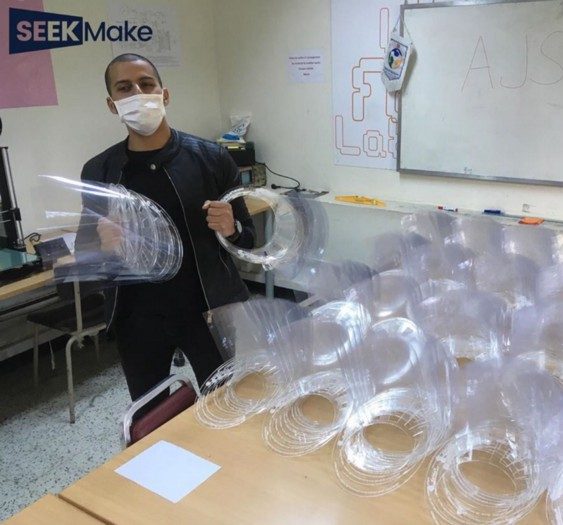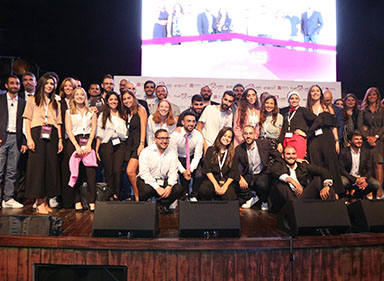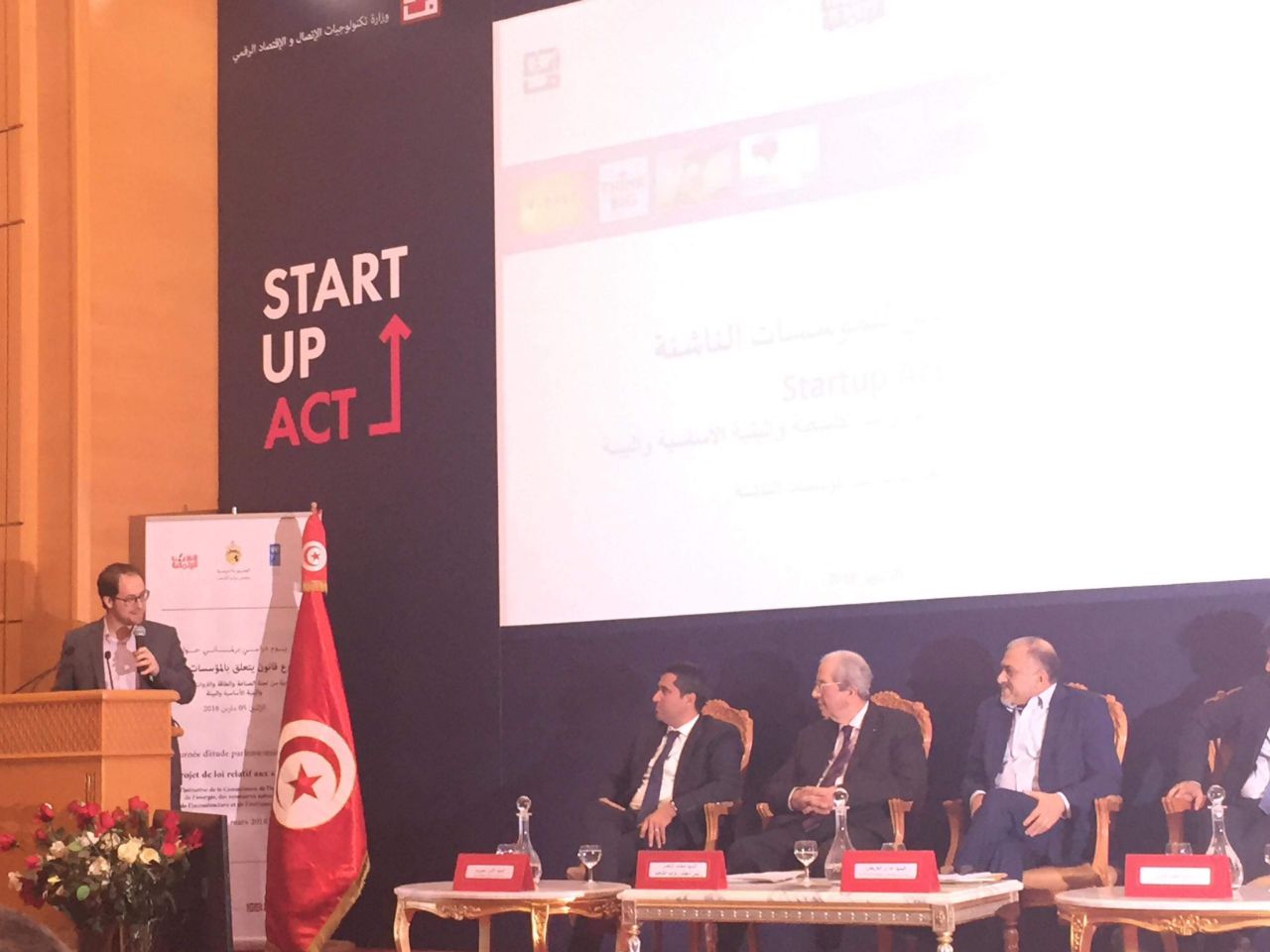Author: Omar
Flat6Labs Tunis Hosts Its Fifth Demo Day & Graduates 8 Startups Digitally
Flat6Labs Tunis has proudly celebrated it’s fifth Demo Day on Wednesday May 13th at 2 PM Tunis time / 1 GMT online, with 8 innovative startups presenting their businesses to hundreds of registered attendees.
The fifth cycle includes startups operating across a range of industries including Industry 4.0, Automotive, Marketplaces, Robotics, Education, FinTech and Tourism. All startups have technology at their core and ready to showcase their products to potential investors, media and the larger business community.
You can view and connect with the startups here: https://demoday.flat6labstunis.com/.
The accelerator has strategically worked to expand its network by constantly promoting new partnerships with stakeholders in the public and private sectors. Its main partners are Meninx Holding, the Tunisian American Enterprise Fund (TAEF), BIAT Bank, as well as the International Financial Corporation (IFC) who joined the fund last year. The recent partnership with IFC includes an investment of $1M in the Anava Seed Fund managed by Flat6Labs Tunis to encourage women and youth initiatives, in addition to technical support to the accelerator.
During the past 3 years of operations, the startup accelerator and investment fund has reached many important milestones that include supporting its portfolio by securing follow-on funding, creating jobs, increasing awareness about entrepreneurship and supporting startups across the local ecosystem in Tunisia.
Flat6Labs Tunis has received more than 1,500 applications, but only 36 Tunisian Startups were chosen for our five cycles and they were the ones who graduated from the program with an initial investment of 200,000 TND, in addition to technical perks, rigorous training, coaching, access to an extended network of investors that enhanced their business development and their products and services.
Moreover, the accelerator played a major role in inspiring young people towards entrepreneurship by engaging with the community and partnering with local universities and professional organizations with a major focus on entrepreneurship such as Open Startup Tunisia and Enactus, as well as corporates like E&Y and Meubles Intérieurs.
Flat6labs Tunis also organized large events such as Startup Open Doors which gathered more than 100 startups across the country during the Global entrepreneurship Week. Flat6Labs also hosted a Job Fair in collaboration with the Facebook Developers Circle where 35 startups offered more than 100 jobs to 500 participants. And last year, Flat6Labs Tunis launched the Investor Academy, an initiative focused on creating awareness about investment in innovation and startups specifically focusing on Business Angels.
Subscribe to the event: https://demoday.flat6labstunis.com/
StartSmart 5th Webinar Recap: COVID-19: Opportunities and Lessons Learned
In our fifth Flat6Labs StartSmart Webinar, Roxanne Varza, Director of Station F exposed what the COVID-19 pandemic offered and still has to offer to startups in general, no matter where they are: MENA, Europe or US. This crisis is changing the landscape of the startup and tech ecosystem, and Roxanne & Faten Aissi Flat6Labs Tunis Marketing & Outreach Manager discussed the lessons learned and how innovation tackled some of the most severe aspects of the quarantine in Health, entertainment, WFH and education.
Take advantage of talents that have been laid off around the world
Due to the current economic crisis, many startups and corporates are laying off people to maximise the business’ chance of surviving the economic recession. So they are laying off people, this is where if you as someone just starting out or your business is growing rapidly can utilise this chance to hire remote employees. This is an opportunity for you because you can get a magnitude of experienced people, who can help your business grow and scale, remotely.
Customer service is essential the more you grow
Understanding that your small team will not be capable of always answering questions, receiving complaints, or following up with magnitude of people is important to knowing when to outsource your customer service or build a team dedicated to just that.
Companies needn’t be ashamed of downsizing, but someone needs to take responsibility
During the pandemic, many companies went the route of laying off people, but taking responsibility for your business operations, means that you care for business, your clients, and your staff. People can grasp the reality they are in, but they need to be assured that they were worth every resource the company has put into hiring, training, and employing them. It is more than just a nice gesture or politics, it is honest and responsible.
If we want to see long term, positive change, we actually need to commit ourselves to positive change
While the pandemic has held most of us hostage in our homes, it has provided an opportunity for the environment to get better. If we want it to keep getting better, we need to find solutions to do that, while still living our normal lives. COVID-19, on the good side of things, has provided us with a lot of opportunities that need to be explored by our aspiring entrepreneurs.
Always be dedicated & focused
If you start something, finish it. Don’t get sidetracked, Work until your vision has become your reality, but until then, keep your focus on one project at, one startup at a time.
Make sure to join our upcoming Webinar on May 19th, 2020 with Patrick Riley, CEO of Global Accelerator Network along with Fawzi Rahal, Managing Director of Flat6Labs Beirut. For more information and to register, click here.
Flat6Labs Bahrain Hosts A Digital Demo Day & Graduates Cycle Four Startups
Flat6Labs Bahrain held its fourth Demo Day, also its first Digital Demo Day for its 4th Cycle on the 6th of May, 2020, where 7 innovative startups presented their businesses virtually to hundreds of registered online attendees.
The 4th Cycle included startups addressing problems with unique solutions across an array of industries including Telehealth, Education & Student Services, F&B, Lifestyle Applications, Fashion Tech, Exergaming, and Fitness Applications. All of the startups have technology at their core and are ready to showcase their product to potential investors, the media and the greater business community. Registration for the digital event can be made at:
The graduation of the latest batch means that Flat6Labs Bahrain has successfully completed four Cycles since its launch in March 2018. Within its 2 years of operations, the accelerator has reached several milestones which include job creation, supporting startups & the local ecosystem, raising awareness on entrepreneurship in the country, engaging with youth and women through community engagement activities, supporting its portfolio with securing follow-on funding and more.

Out of 1,100+ applications that were received by Flat6Labs Bahrain, a total of 28 companies both Bahraini and international have graduated from the programme with a USD $32K seed investment, as well as rigorous training, coaching and mentoring that have enhanced their business development and product/services offered. Several of these have gone on to receive much traction and become renowned names in the Kingdom’s startup ecosystem such as Inagrab, Telp, Sinc, Majra, Tamarran, Akalati and Springring. Through its expansive network of VCs in the region which include Faith Capital, 500 Startups and Arzan VC; the accelerator has successfully supported several of its portfolio companies in raising a collective sum of USD $1.6 Million in follow-on funding; over a 2x multiplier of the initial invested amount.
Flat6Labs Bahrain has also contributed to economic growth in the country through not only investing in innovative & youth led businesses, but in job creation as well. Together with its 28 companies, 100+ full-time jobs and 70+ internships have been created. Furthermore the accelerator has played a key role in inspiring youth towards entrepreneurship through its community outreach by partnering with all the local universities and professional institutes and conducting workshops to educate the public on how to approach launching a startup , offering its space for free for ecosystem events, participating in key ecosystem activities, mentoring through programmes such as Injaz, Mashroo3i and Intelaaq, speaking at panel discussions related to startups, youth and women, sponsoring prizes in startup competitions by offering a seat in the Cycle Bootcamps, and organising its own community events such as its Women in Startup panel during GEW 2019.
The accelerator has worked strategically to expand its network by consistently fostering new partnerships with public and private sector stakeholders. Its two main partners are Tamkeen and EDB, however Flat6Labs Bahrain has also forged over 40 partnerships which include Zain Bahrain, its official Telecom Partner, AWS, Microsoft, GAN, Bahrain Fintech Bay, Tenmou, Charles Russell Speechlys, BIBF, Ahlia University, University of Bahrain, Royal University for Women, Arabian Gulf University, and many more.
Pakiza Abdulrahman, Head of Startups at the Bahrain EDB, said: “Flat6Labs Bahrain is a key contributor to the Kingdom’s fast-growing startups ecosystem. It achieves tangible results for its portfolio companies — whether they be innovative homegrown, Bahraini startups or international entrepreneurs seeking a regional base to grow and scale their ideas and businesses. These local and international startups are the backbone of our ecosystem. I look forward to congratulating many more Flat6Labs Bahrain graduates in the years to come.”
Check out the Demo Day and our startups here.
StartSmart 4th Webinar Recap: Impactful Communication with Investors During COVID-19
In our fourth Flat6Labs StartSmart Webinar, Mike Preuss, Co-founder & CEO of Visible.vc along with Marie Therese Fam, Managing Partner of Flat6Labs Cairo, discussed how startups can approach investors virtually but effectively during the pandemic. Mike and Marie highlighted how you can leverage KPSIs and metrics to win over investors, and how it is virtually possible to communicate all of that online.
Cash Has Never Been More King than today
How you will be managing your burn rate in the upcoming months is much more important than how much you are growing nowadays. Investors will be looking at your ability to to maintain cash flow, while still running your business, Mike said.
Send consistent updates
Mike said that in one of their surveys, they have discovered that founders are more likely to get investments if they are consistent with their reports to investors, in fact it increases their chances by %300. During the COVID-19, investors will likely be looking at startups that has a record of maintaining their reports. Most founders can’t raise because they don’t update investors regularly.
Where You See Failure, Investors See Opportunities
From developing multiple relationships with startups and funding many, investors develop this pattern and skill to recognise troubles and opportunities. If an investor sees that your metrics haven’t been met for this month, they might consider funding you or providing you with the resources to help further grow your business. Don’t fall short on sending your reports as much as your investors want, and compare on a month to month basis.
Consistence Cadence Will Help Your Investors Fully Trust you
Instead of micromanaging you into sending reports, setting clear KPIs, and metrics, or having unreasonable demands of you because they don’t really understand the nature of your workflow, you will give them what they want beforehand, so that automatically stops you from getting innumerous requests. In the eyes of the investor, you are an active and an engaged entrepreneur. Consistent cadence also gives you time to reflect on your operations, and what needs to be done or changed.
If You Don’t Need The Money, Don’t Raise The Money
Some bad investors will be looking out to getting the maximum out of your business for little change. You have to be careful while choosing your investors during the COVID-19 pandemic, and if you can maintain your position in the market and operations, then there is no need for it.
Make sure to join our upcoming Webinar on May 5th, 2020 with Roxanne Varza, Director of Station F along with Faten Aissi, Marketing & Outreach Manager of Flat6Labs Tunis. For more information and to register, click here.
StartSmart 3rd Webinar Recap: Building a startup in Silicon Valley
In the third webinar of the StartSmart Webinar Series, Amira Yahyaoui founder of MOS, a Silicon Valley based startup, and Tarek Chelifah, Flat6Labs Tunis Senior Program Manager, discussed what it is like to build up a startup in Silicon Valley and how it compares to building one in MENA. Here is the quick recap.
“You don’t need to be in silicon valley to do something great”
To Amira, an entrepreneur should first and foremost be building for the experience, the journey, and changing people’s lives. Entrepreneurs need to realise that wherever they are in the world there are problems that require innovative solutions, which will ultimately change people’s lives, hence, “you don’t need to be in silicon valley to do something great,” Amira said. She added” “the only interesting thing about silicon valley is the technology and the people,” and if you can read books, watch webinars, and listen to podcasts coming from the silicon valley, you can start anywhere.
“Don’t think of just your country, think regionally”
Entrepreneurs are always caught up in building startups with a focus on the local market, but if we try to look for differences between the Egyptian and Bahraini market, we won’t find many. At the very core, our cultures, markets, and purchasing powers are very similar. So “don’t think of just your country, think regionally.”
“Failure is loved cherished, and accepted in Silicon Valley”
One of the things that Amira highlighted was that people in Silicon Valley seem to be very resilient, hardworking, unshaken by fear of failure, and are risk-takers. ‘“Failure is loved, cherished, and accepted in Silicon Valley” because you learn from it, and investors look for people who are hardworking, passionate, and experienced. we won’t find many.
“I believe so much in hunger & scarcity to build”
Amira believes that being an entrepreneur means that you can do lots of things with limited resources. Get creative with the resources you have, and utilise everything you have to its maximum potential. “You cannot build anything in silicon valley if you are not willing to work hard,” Amira said.
“To get to Series A you need to show a considerable spike in the number of users/clients”
After getting your seed fund, don’t expect investors to be encouraged to invest in your startup if you haven’t had a considerable spike in the number of clients/users/customers. This is what investors in Silicon Valley look for, they want to see that your solution is in demand because if it is not, they will not invest. A product/solution is only great if people need it.
“Find people who fit your company culture”
“Find people who fit your company culture,” Amira advised. No matter how much you believe in hiring people with different backgrounds and personalities, working with people who are naturally aligned with your company values, ethics, and goals will get you the best results and it will help your startup grow tremendously. Hire people you want to work with!
If you have any questions, you can reach Amira on any of her social media accounts using @mira404.
Make sure to join our upcoming Webinar on April 28th with Mike Preuss, Co-founder & CEO of Visible.vc along with Marie Therese Fam, Managing Partner of Flat6Labs Cairo. For more information and to register, click here.
How Flat6Labs Startups Are Mitigating the COVID-19 Outbreak Hurdles
During this pandemic, some industries will grow exponentially, while others will struggle to stay afloat. We set out on surveying a sample of 80 active startups to observe how our founders are maneuvering the pandemic, what is needed for survival and for continued growth and scalability, and how should the founders capitalise on the current situation to maximise their revenues, raise their brand awareness, and develop new products and services.
Our startups are in the edtech, agritech, healthtech, logistics, fintech, IT, transportation & travel, and SaaS industries, and it has been noticed that those whose business models depended heavily on legwork (the physical presence of someone on the job), have either shifted their operations completely online, halted their operations for the time being, or continued operating normally due to the nature of the business model that allows them to do so (for example: the delivery of essential products such as medicine, food, water, & sanitary).
52.6% of the startups surveyed required legwork, and as previously mentioned, were the startups majorly affected by the outbreak, whereas the 46.2% percent that didn’t depend on legwork at all, seem to be either operating normally or their businesses are booming.
With around 61% (49 startups) of the startups sampled not operating normally, approximately 81% (40 startups of the 49 startups) have already devised plans, strategies, and even new business models that allow them to adapt to pandemic, which will be discussed shortly. These startups are in the transportation, travel, agritech, logistics.
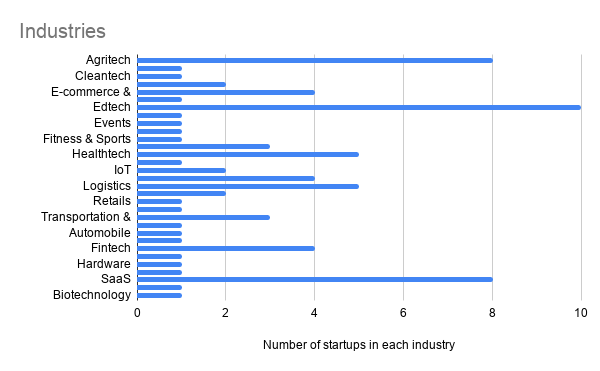
The rest of the startups are either operating normally or beyond normal capacity because of the pandemic, and they are in the Edtech, SaaS,
The rest of the startups are either operating normally or beyond normal capacity because of the pandemic, and they are in the Edtech, SaaS, Fintech, E-Commerce, and IT industries.
Industry Breakdown
Agritech
Around 62% of the startups in agritech require legwork, this is because the nature of the job itself demands the installation and maintenance of tech equipment that aid and makes their processes more efficient. Hence their ability to work at normal capacity is affected.
LifeLab Biodesign (Flat6Labs Beirut): They are delaying the legwork farther into the process until the lockdown is lifted. LifeLab designs and deploys fully-automated, climate-controlled vertical indoor farming technologies.
IoTree (Flat6Labs Beirut): They are currently pushing out new features into their already installed products/services to be capable of retaining clients after the outbreak. IoTree is a wireless sensory network of smart traps that are developed using a deep learning algorithm for the early detection of harmful pests and insects in farms.
Conative Labs (Flat6Labs Cairo): They are rescheduling deliveries and dividing the teams so that the workplace isn’t congested. An IoT-enabled water quality monitoring and alarming system for aquaculture.
The plans that they both have devised seem to be common across many of the agritech startups at the moment, and are helping them mitigate the situation.
Healthtech
The results of the healthtech industry were inconclusive, as our startups have very different business models, and most of them require legwork (60%).

Chefaa & Pharmaklik (Flat6Labs Cairo & Beirut): It is important to note that although legwork was required, some businesses weren’t incapcitated by it as they use delivery services to bring medicine to homes. Chefaa, a Flat6Labs Cairo startup, and Pharmaklik, a Flat6Labs Beirut startup, are examples of startups doing well because of the service they provide. Chefaa have also added a new application feature that allows customers to know all about the latest updates of the COVID-19.

MedMisr (Flat6Labs Cairo): They are offering their services at discounted rates. MedMisr is a digital third party administrator providing medical insurance companies an innovative online paper-free solution with fraud controls.
Logistics, Travel, & Transport
Transportation (e.g. ride-hailing), automobile and travel booking platforms have been reported as one of the most “at risk” industries — however, should some startups adapt to the current changes in customer preferences and consider instead the delivery of groceries or medical supplies, they may have a more sustainable business while ensuring they take their customers best interest into consideration (quality and price-wise).
Transpooler (Flat6Labs Cairo): They are considering using their transport tech platform to cater to a different sector (previously students) which would utilize their services more, while managing their expectations it will be still be difficult to acquire customers and convince them to use the platform. Transpooler helps schools and nurseries to monitor their fleet service and offer parents and students live tracking, speed monitoring and chatting.
Wantotrip (Flat6Labs Tunis): They have convinced their travel customers to retain the amount they already paid as credit for future trips (rather than refund) in an attempt to keep their customers on their platform and utilize it once they’re able to travel again. Wantotrip is an international travel platform offering authentic and themed travel packages around the world for communities or individuals.

Shabeb Delivery (a Presentail company) & Hommy Cook (Flat6Labs Beirut & Bahrain): Startups in the logistics industry with a focus on food delivery seem to be doing exceptionally because of the rising need for distancing and having a contactless life during this period. Shabeb is a quick last-mile delivery service for your business, they have also collaborated with the lebanese food back to deliver food to unfortunate families’ doorstep. With the press of a button, we’re at your door in minutes. Hommy Cook helps cooks make money by selling their home cooked food to thousands of customers through Hommycook.

Hovo (Flat6Labs Cairo): They are using the current period as an opportunity to raise brand awareness and have an increased community involvement. They are buying essentials for the elderly and vulnerable families and delivering it to their doorstep. HOVO is a tech-enabled logistics partner that provides trucks in 20 mins across Egypt.
SaaS & IT
Since almost everyone is, at the moment, dependent on online management tools and services that make work life seamless, it was imperative to see that SaaS startups are doing well and even exceeding expectations. In regards to IT, startups were mostly doing well without any legwork, however, some startups that dedicated their services to restaurants for example, weren’t doing that great.
Untap (Flat6Labs Cairo): Untap is collaborating with high profile companies to manage competitions such as organizing an online regional hackathon for Dubai Future Foundation. They have also launched One Million Arab Coders initiative to find solutions to the challenges posed by COVID-19. Untap is a submission management system used by organizations to easily launch and manage online prize-based competitions and calls for applications.
Nural Technologies (Flat6Labs Bahrain): This startup built around the idea of online management of teams and tasks seem to be doing exceptionally well during this period without much required adaptation.
E-Robot (Flat6Labs Tunis): Have shifted most of the engineers work online. E-robot Software develops IT automation solutions to create web and mobile applications without code writing.
Fintech
It is normal to see that the Fintech industry is booming during the pandemic, this is largely due to people seeking safer alternatives to banknotes. In fact, some governments are adapting that kind of technology into the national banks. There was one drawback anyhow, which is financial inclusion. Around 25% of the startups that had its primary focus on financial inclusion through their services are operating below normal capacity. It is important to highlight this shift in the industry trend because during these times, it is even more important to find a way to get to those who are unbanked.
Juno (Flat6Labs Beirut): This startup is targeting the unbanked population and has moved most of its operations online, but they are facing difficulties reaching potential customers. Juno digitizes banking focusing on simplicity and personalization to provide financial services.
-Edtech
It’s no surprise that the outbreak will dramatically transform the global higher education sector creating a new normal for how courses will be taught moving forward; in short, it will revolutionize the online learning landscape which can translate to potentially successful ventures for startups in the Edutech industry.
GoMyCode (Flat6Labs Tunis): GoMyCode has already started adapting by selling online via Facebook and decided to kick off their e-learning platform in the coming few days instead of this September as planned. In an effort to popularize their brand and attain their customers, their platform will be temporarily for free and they managed to also create a community of teachers who will be volunteering. GoMyCode is High-end computer Science Education startup with a unique learning experience that leaves lasting impressions and positively impact our students’ lives.
Spica Tech (Flat6Labs Beirut): Spica Tech has started building an online community surrounding their students where they can share their learnings and progress on the online coding and storytelling program available on the platform — which has been since heavily promoted in order to offset offline learning that some of the students were accustomed to. Spica Tech academy teach kids (5+) and teenagers game development as a way to reshape Science, Technology, Engineering, Arts and Math.
On a regional scale, it has been reported that startups which rely more on legwork are facing increased difficulties managing their business, as well as shifting to the digital landscape since they’re not acquiring enough subscriptions or having sufficient equipment essential for creating content.
E-commerce & Shopping
Cleaning supplies, personal hygiene, supplements among others that the everyday consuIt’s no surprise that the startups that are most likely thriving nowadays are e-commerce platforms where they provide and deliver everyday necessities, from products ranging from healthy snacks,mer will find beneficial in order to combat the new “normal” lifestyle they’re leading today.

Mint Basil Market (Flat6Labs Beirut): This startup is focusing on products that their customers will continue to value in the months to come, and they have been lately adding a new immunity boosting collection of products, ensuring that their platform will be able to fulfill the needs of those who are navigating towards a more healthy lifestyle from the comfort of their home since they also include free delivery (while taking the vital safety precautions). Mint Basil Market is an e-commerce platform that offers a wide range of healthy, natural products, from food to cosmetics, and which can be delivered straight to people’s doors.
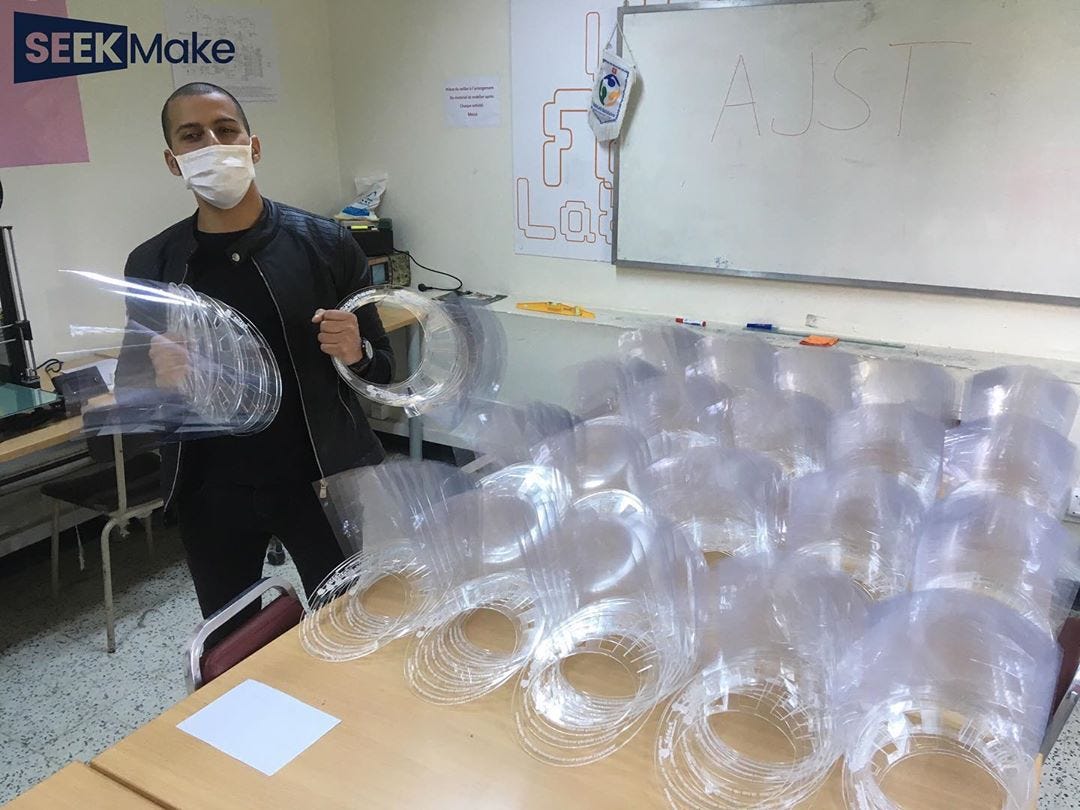
SeekMake (Flat6Labs Tunis): In order to help the doctors who are facing the COVID-19 pandemic in Tunis, Seekmake has mass produced masks to help protect frontline doctors who are dealing with the pandemic daily. SeekMake is a marketplace linking CNC, laser machines and 3D printer owners with designers and end users.
Dabchy (Flat6Labs Tunis): A Flat6Labs Tunis startup is increasing their marketing efforts to maintain their involvement in communities by pushing out empathetic messages. They are aiming to reach more people by opting for more ads and less organic content in this period of declining sales and unengaged people. Dabchy is a women marketplace that allows women to revamp their wardrobes easily: they can earn money by selling their used clothing online, buy other clothes at discount prices and share their personal style.
Startups that have a B2B business model or B2C but provide non-essential products and services, such as clothing, jewelry and the like, won’t find success since their customers buying power is on an all- time low for luxury products instead shifting their preferences to food, vitamins, everyday home essentials, sanitary products, among other items that will need to constantly purchase for an unpredicted time frame. An additional problem for these startups is that should they decide to promote their businesses, they can come across as tone-deaf to the financial situations of their audience — it’s increasingly challenging for them to keep their business afloat while retaining the praise of their customers simultaneously. However, the silver lining is that some startups can find success should they be able to pivot by changing their business model to selling products that people can benefit from during their home quarantine (such as home gym equipment, books, toys and games).
Our main takeaways
The industries most negatively affected by this phenomenon were: transportation, travel, agritech, & logistics. On the other side of the coin Edtech, SaaS, Fintech, E-Commerce, & IT seem to be doing relatively well.
For all of the startups, it is highly advised that you begin looking for cash & funding, and cutting down costs without affecting the operations of your businesses. It is also important to start working on research and development, perhaps even pivoting to accommodate the current needs of the market.
When it comes to marketing and sales, if you can’t see your startup being of any help to the people, work on raising brand awareness but be sensitive to other people’s pains. It is due time for some good CSR. Also, a good strategy moving forward with your sales is to offer people discounts, giveaways, and free services in return for their loyalty, and sell (mostly) the things that they need the most at the moment.
It is also a good opportunity for startups to start going online, find a way to make their business become mostly cloud-based. If you can do that, you can truly future-proof your startup.
Check our #StartSmart Webinar recaps:
–“How to Take Off Your Startup During COVID-19” here.
–“How to Out-Innovate” here.
StartSmart 2nd Webinar Recap: How To Out-Innovate
In the second webinar of the StartSmart Webinar Series, Alexandre (Alex) Lazarow, a global investor and author of “Out-Innovate: How Global Entrepreneurs from Delhi to Detroit Are Rewriting the Rules of Silicon Valley,” and Saleh Abbas, Flat6Labs Bahrain’s Marketing & Outreach Manager, discussed how entrepreneurs in the MENA region are implementing innovative approaches to running a successful startup.
The challenges that startups face in emerging markets are normally comprised of a mix of lack of access to capital, availability of highly skilled talent, and inability to create a structure for the startups, Alex said. Whereas, in Silicon Valley, startups enjoy access to multiple sources for capital growth. This is exactly why Silicon Valley startups scale and grow much faster than their counterparts in MENA, Asia, etc…
“Entrepreneurs around the world have to do more with less”
However, Alex believes, entrepreneurs around the world have more in common than any one would think, but the startup ecosystem, the economy, and the laws and regulations that a startup is bound by is what changes the story.
“Silicon Valley must learn from other centers of innovation”
In the times of the COVID-19, nevertheless, Alex said that Silicon Valley startups who have been privileged with access to growth resources, should take a look at how startups in the MENA are utilising limited resources to grow. Startups in general need to focus on what can be learnt from the pandemic and re-think their business model; focus on what they provide, and focus on sustainability.
“Use the pandemic to hire remote talents”
The pandemic is a great opportunity for startups to realise the potential of hiring remote talents to grow and expand their business operations. As Alex put it, “if you are capable of building your business remotely, you are also building the muscle that will support your local, regional, or global expansion.” Hiring remote talents also gives you access to areas of expertise that might not be available in your ecosystem at a lower cost even.
“Startups in the frontier ecosystems need to think globally”
Alex elaborated that startups in growing economies need to think of how their startup can expand globally or regionally when they are just starting out. It is important to create a solution that could be adapted to different cultures and economies because it will facilitate your growth. He highlighted that most of today’s unicorns had going global at their core from the very beginning. Entrepreneurs need to think about how you can build teams that communicate efficiently across the world, and how they can build that global muscle from day one. Also, the pandemic is enabling entrepreneurs to reach out to global investors without the need to travel. This is a chance for them to raise money and approach remote investors.
We highly recommend Out-Innovate as one of the top reads in the VC/Startup genre , you can get yours… here.
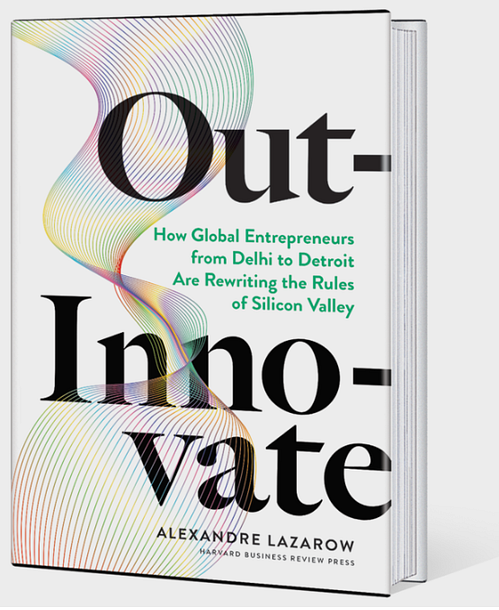
Don’t miss our upcoming Webinar on April 21st with Amira Yahyaoui founder of MOS, a Silicon Valley based startup. For more information and to register click here.
StartSmart 1st Webinar Recap: How To Take Off Your Startup During COVID-19 Outbreak
Two prominent figures in the entrepreneurial industry, Christopher Schroeder, a global investor with 20+ years of experience in entrepreneurship and Hany Al Sonbaty, Flat6Labs & Sawari Ventures Co-founder have hosted our first Webinar on “how to take off your startup during COVID-19 Outbreak. Here is a quick recap.
Harbour Your Cash and Reflect
The first advice we got from Schroeder for startups is to “harbour your cash.” Meaning that you as startup founders need to focus on cutting down costs if you are not generating considerable revenue, so that you will be capable of surviving and prospering after this period ends. Another point of the discussion was that some startups might struggle with raising money, or they will be met with “bad” venture capitalists who will try to take advantage of the situation, and it is imperative that you avoid them. He has also mentioned that it is important for founders to continuously reflect on what they are learning, and use it to develop their business moving forward.
Questions to ask yourself from Chris:
1) What do we believe now that we think might be different in the future?
2) What do we believe now that will be true of all times?
3) What are three things that we now know, we should have done differently?
Transferring Company Culture Virtually Isn’t Easy
Amidst all this, Schroeder has also stressed that transferring company culture, virtually, is not going to be easy. You have to have a very structured and clear plan for your team during this period on what needs to be done, how you are going to do it, and what means of communications are required.
The Pandemic Heightens the Need for Inclusive Services & Products
As we’ve all seen, this pandemic and the move to online communication, transactions, consultation, etc… has deepened the need for our economies to be inclusive of those who don’t have access to such technologies. Entrepreneurs should cease this opportunity to create solutions that bring inclusivity to a new level, Schroeder added.
Investors Are Not Looking for Crystal Ball Answers
On another topic, entrepreneurs should be aware that when approaching investors, those investors are not looking for “crystal ball answers,” they want to see determination, an ability to adapt and process new information that will benefit their business.
The Pandemic Has Opened People Up to The Virtualness of Things
Talking about the industries growing rapidly during this period, he mentioned that online education, fintech, and communications tools are growing massively, which could possibly have implications on how we operate after the pandemic. “The pandemic has opened people up to the virtualness of things, and to make use of them to make things more efficient,” as worded by Chris.
Read Books That Enrich You
Schroeder had also few tips on utilising the #StayHome policies that many governments and businesses have adopted by recommending that you read when you can. He said that it requires both discipline and trading off other leisures to make it work, and he outright advised against reading books like “how to survive pandemics.” Instead, entrepreneurs should be focused on reading books about how to navigate a business/startup, how to scale it, and basically anything that could enrich you with a new perspective on managing your business.
Chris’s most recommended books:
– Bill Burns — Back Channel
– Robert Caro — Working
– Ron Chernow — Grant
– Bernard Fall — Hell in a Very Small Place
– Ben Horowitz — What You Do is Who You Are
– Yu Hua — China in Ten Words
– Robert Zoellick — America in the World
Read his full Linkedin article here about the best books to read.
Make sure to join our upcoming Webinar on April 14th with the renowned global investor and author of ‘Out-Innovate’, Alex Lazarow. For more information and to register click here .
Are These The Types of Startups MENA Needs Right Now?
The realisation that startups have become a pillar to sustainable economic development has dawned upon many in the past few years in the MENA. Driving an eclectic mix of forces to venture, fund, accelerate, and incubate startups, and to support this ecosystem that breeds innovation. With each passing year, there seems to be a change in the sector trends, and where the fund providers seem to be more attracted towards. Should the focus remain on the most promising sectors or towards those with untapped potential? While both options are being explored by Flat6Labs & StartEgypt and other concerned bodies, the 2019 MENA Venture Investment Summary by Magnitt, highlighted that in 2019, Transport received the most funding; FinTech had the highest number of deals, and IT Solutions had the fastest growing number of deals.
If anything, this Magnitt report highlights a market that is becoming highly saturated with companies who are creating solutions in the aforementioned industries; generating revenue, closing investment rounds, and even closing exit deals in those very industries. It has become a highly competitive market for these companies, and if you don’t have something unique that differentiates your product/service, backed up with a strong knowledge of the market, you are most likely to be stomped by competition. What about other industries with untapped potential? How do they fair in comparison to the most trending sectors?
Gaming & E-Sports Market Share Will Reach $300bn by 2025
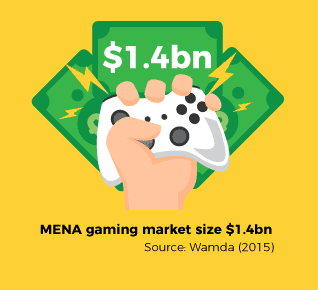
Gaming for one is an industry that has a stronger standing than the film and music industries, combined. It is expected that by the year 2025, the gaming and e-sports global market share will reach $300bn annually, according to Market Watch. Also, the MENA mobile gaming market share is growing at a steady rate in comparison to other regions, recording $680m in 2015. Most game developers and game studios are using microtransactions as a business model, and are generating high revenue. However, this strategy comes at a cost. Some game developers tend to abuse this business model to generate more revenue by hindering gamers’ progress unless they buy some of the in-game features they have on offer. It sets off the user, and causes rebellion (a great example of that is BattleFront II). The caveat here is to be capable of adopting such a profitable business model, while keeping the users engaged and without messing with the gameplay.
Other Gaming & E-Sports Flat6Labs startups: Seemba, VRapeutic, The Stories Studio, YAYY Studio, & SpicaTech Academy.
Healthcare Spending Will Reach $144 Billion in MENA by 2022
“According to a report from the Middle East Medical Devices and Diagnostics Trade Association, the annual value of the medical technology market in the region is set to grow to $11 billion by 2021 while overall healthcare spending will reach $144 billion in MENA by 2022 according to Al Masah Capital.” — Wamda.com
Chefaa (an online platform to order prescribed medicine from and a Flat6Labs Cairo Startup) has grown tremendously since they have launched their services to receive a six figure seed round. The startup ecosystem support, along with the high demand for services like Chefaa’s showcases a desire for people to actually use advanced technologies to make life easier. According to another article by Wamda.com, “people are willing to use advanced computer technology or robots with AI that can answer health questions, perform tests, make a diagnosis and recommend treatment.” Also, VRapeutic is combining the knowledge of gaming, VR, and health tech into realising a service that will help autistic children develop a more stable learning path through its VR-enabled learning solution.
Other HealthTech Flat6Labs Startups: Curotrip, AXON Medical, Pharmaklik
E-Commerce & Shopping: Are They Saturated Sectors With No Room For Innovation?
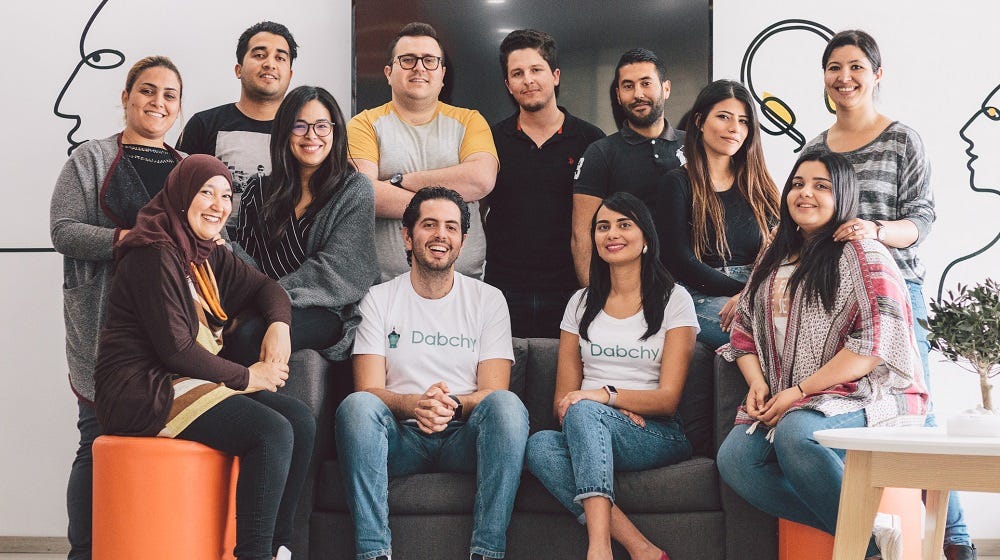
Another promising and highly diverse sector, is the e-commerce and shopping sector, with many problems existing in current platforms and abandoned markets, there are always new solutions to create. Exactly like what three of our startups are doing, while Souq.com is focused on selling any and almost everything, Brimore, Dabchy, & Shiphaly are doing things their own way to help people have a better shopping/selling experience. For one, Brimore (a Flat6Labs Cairo startup) offers end-to-end distribution channels where manufacturers can list their products, then it uses its network of women, housewives, and employees to sell and distribute their products in local circles. Brimore has raised $800k last year alone. Dabchy (a Flat6Labs Tunis startup) is an E-commerce platform with a focus on selling/buying women’s clothing whether new, used, or self-made with an active 400k users and a recent $300k fund. Shiphaly (a Flat6Labs Cairo Startup), on the other hand, is an online platform that helps people buy items from around the world, and helps travelers make money by delivering these items.
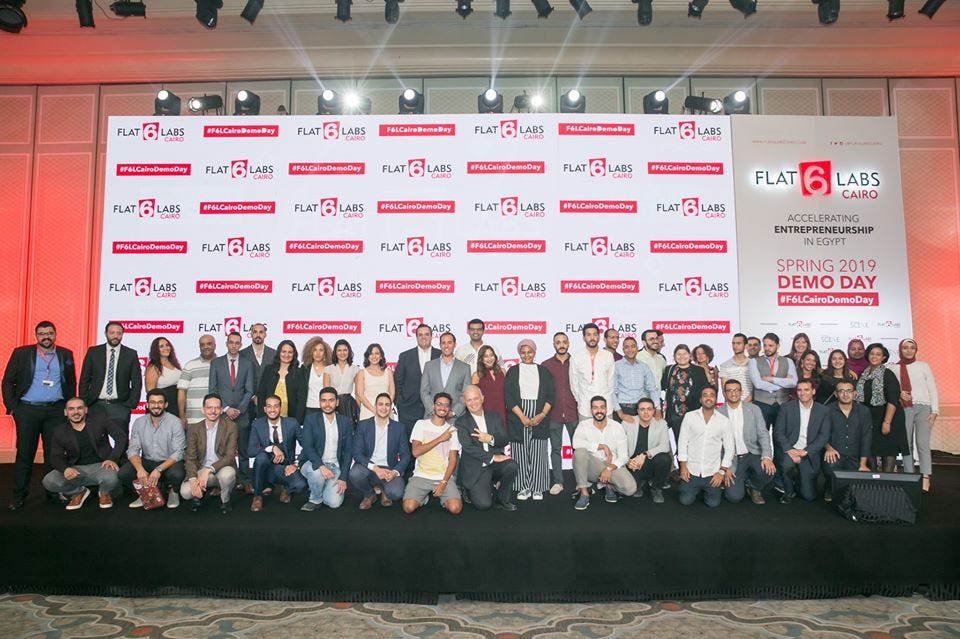
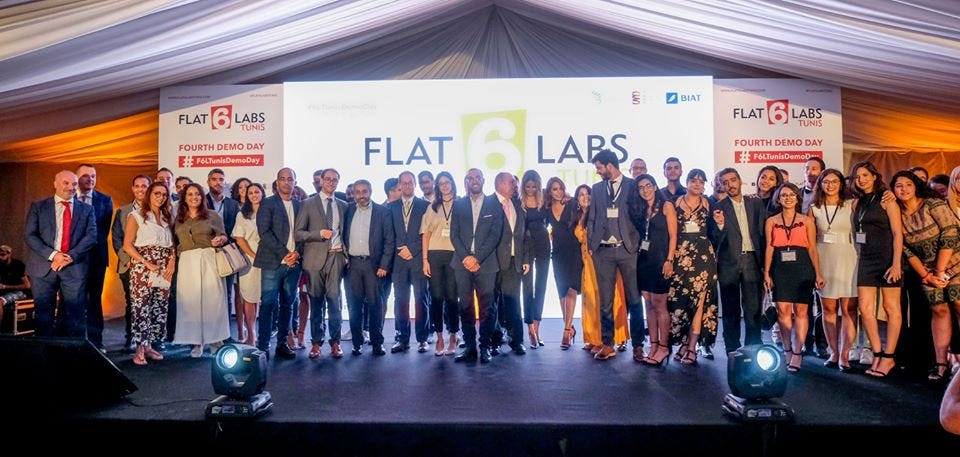
While in any of these industries you have a great chance at success, you do not need to be in a specific sector and following a specific trend to succeed. We welcome all kinds of innovative startups, and we invest in teams, passion, and true drive in every industry as long as they are tech-based. You will constantly be challenged, sometimes you will fail, and sometimes you will need to pivot because you’ve just realised a true gap in the market that you can fill. Do your best and luck will be in your favour. If you believe your startup could be MENA’s next unicorn, apply now for one of our programs: Flat6Labs or StartEgypt.
We want to see you make a dent in the industry you are in.
Here Are 5 Reasons Why Governments Should Implement Startup Acts Like Tunisia’s
In order to create a more dynamic startup ecosystem that fosters innovation and encourages entrepreneurs to venture into unknown lands, governments, corporations, and policymakers must understand the benefits of employing new policies and passing new laws that supports the geeks behind each innovation.
While governments across the MENA region have been allocating funds and initiating programs to support early-stage startups, there is little to be seen when it comes to enacting standardised laws that maximize the entrepreneurs’ chances to success.
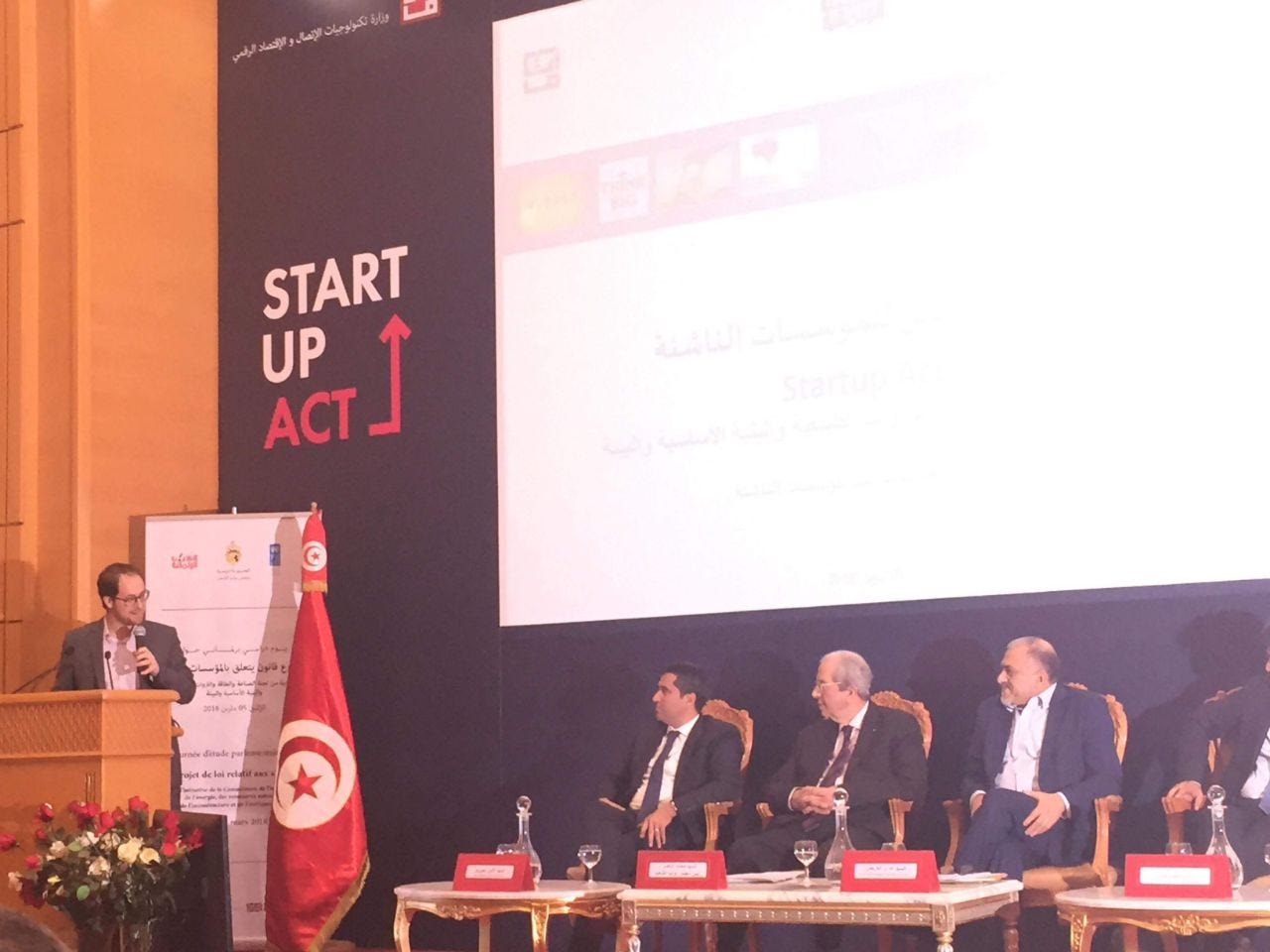
“New policies and regulations should take into account the challenges faced by entrepreneurs and the needs of the ecosystem. The timing of the Startup Act couldn’t be better as it stimulates and encourages entrepreneurship across the country. Ultimately, it will result in thousands of new jobs created, important advances in technology and national economic growth.” — Yehia Houry, Flat6Labs Tunis’ Managing Director
Tunisia is one of those countries with its eyes set on empowering its startup ecosystem, and allocating the necessary resources for its hungry and passion-driven entrepreneurs.
“The Startup Tunisia initiative is meant to put the country on the map of startup-friendly ecosystems, sustained by three main pillars: the Tunisian Startup Act; the 200m Euro Fund of Funds; and the ecosystem support. With these things in motion, a synergy effect is expected to be produced between three key players: Investors, as the growth engine; incubators/accelerators as the performance lifter; and Startups as the economic and innovative locomotive.” — Haythem Mehouachi, General Manager of Smart Capital, Startup Tunisia operator.
Through Tunisia’s latest Startup Act, it hopes to create a fertile ground for innovation that both encourages competition and propels individuals who seek to utilise their solutions to the benefit of the community in many industries through its pre-set criteria (as quoted from the Tunisian Startup Act).
– Its legal existence does not exceed eight (08) years from the date of its constitution
– Its human resources, its total balance sheet and its annual turnover do not exceed the ceilings set by government decree
– More than two-thirds (2/3) of its capital is held by natural persons, venture capital investment companies, and collective investment funds. investment, seed money and any other investment body according to the legislation in force or by foreign Startups
– Its business model is highly innovative, utilizing cutting-edge technology
– Its activity has strong potential for economic growth.
This criteria set ensures that only the innovative, competitive, and ambitious startups get the Tunisian “Startup” label, and according to Salma Baghdadi, Smart Capital’s Startup Ecosystem Manager, 210 startups have earned it; out of which were 20+ Flat6Labs startups like, Dabchy, Tap4Glam, Sqoin, Junior Robotics Lab, Grabingo, Chantier, Logis, Trust It & many more.

Ali Mnif, the Country Manager of Silatech in Tunisia and a member of the ‘Collège des Startups’ and one of the pioneers that worked on the project since the beginning said:
“Clearly, the best thing that could happen is a Startup Act 2.0. All the learnings, the mistakes, the feedback will better shape the second iteration of the key measures to be included.
Startup act 1.0 is a breath of fresh air for many entrepreneurs, startups and investors. It is also a powerful wave that reached many other countries. We keep hearing good news mainly in Africa.
In any iteration, the startup act is capable of breeding more mature startups with solid teams, who are backed up by experienced investors. The challenge would be to quickly incubate, accelerate and support the next regional champions.”
This act should be employed or adapted by other governments because:
1) Promotes Unmatched Innovation of Young & Hungry Entrepreneurs
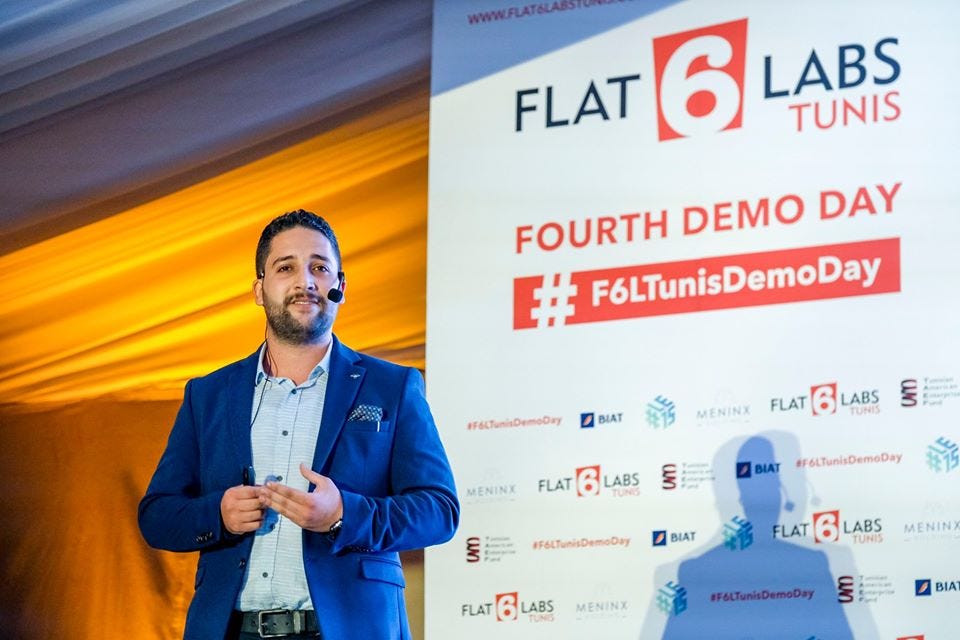
One of the main criteria of getting the startup label is to be utilising a highly innovative business model, and to use cutting edge technology as part of the solution you are offering, be it a service or a product.
2) Releases Entrepreneurs From The Shackles of Failure
Aspiring entrepreneurs are often burdened with the fear of failure, and it seems to shackle most startup ecosystems around the world, with the first thought being losing the main job that earns them a living, the sustained expenses that come with establishing a startup, and more. Tunisia’s Startup Act allows them to maintain the contract they have with their previous employer without the benefits and grants them a “Startup Leave.” This allows them to focus solely on their startup, and gives them a safety net to fall on if it so happens that the startup fails. It also allows for free local and sometimes international intellectual property registration for startups, and exempts them from corporate taxes.
3) More Innovation Means More Competition

While the day to day consumer or business is often limited by the choices of big corporates, and public services that might be either too outdated or lacks quality, startups pave the road for unmatched innovation at often reasonable prices. More startups usually means more competition, and more competition means better products and services for the community at lower prices.
4) Proves that Innovation Is Often Synonymous With Solving Current Problems
Younger generations think daily of their problems, and many have innovative solutions to the problems at the back of their heads. Utilising this power is instrumental to helping governments resolve the country’s problems. When these entrepreneurs innovate, they solve a problem.
5) More startups means more job opportunities.
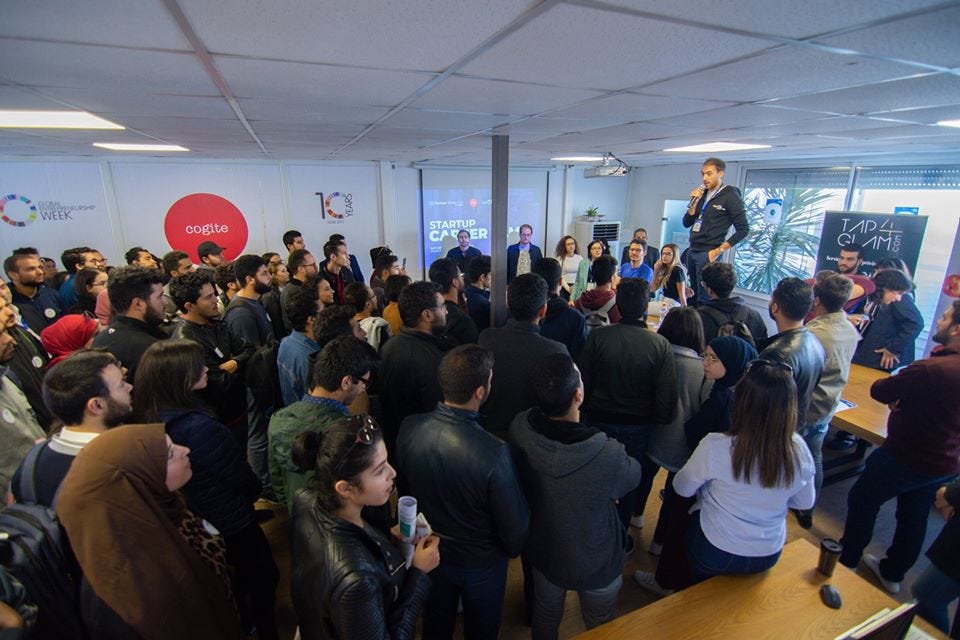
Instead of depending on large and medium-sized corporations and governments to do the hiring, startups can offer fresh graduates a new path of learning that is both beneficial and more challenging with often better pay if the startup happens to succeed.
These factors help sustain economic growth and prosperity for the country and the startup ecosystem. They breed a nation driven by sustained innovation in every corner and every industry.









